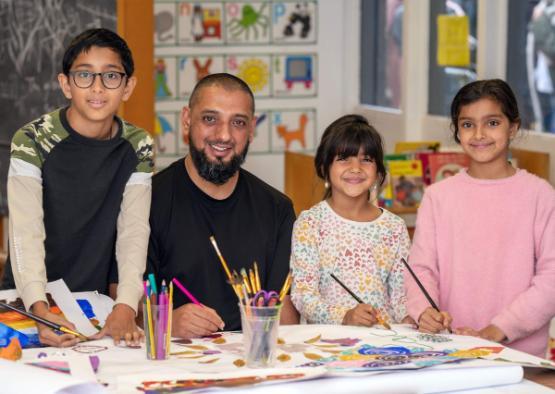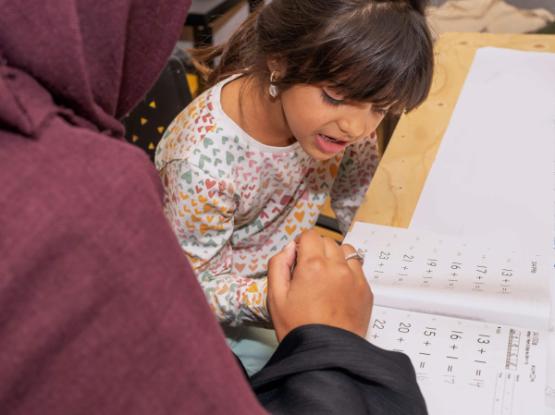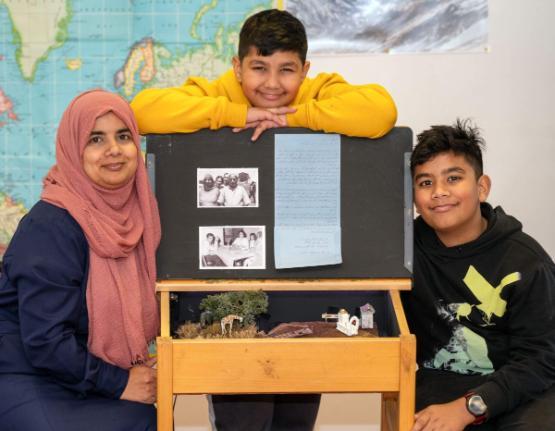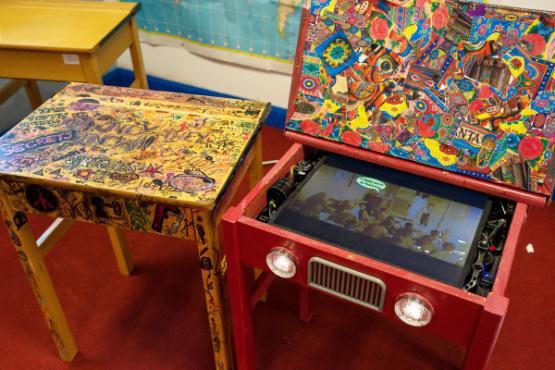Home school families find joy and healing in art projects
FOR software engineer Abdul Ghani, the idea of homeschooling his children felt alien. Having gone through the whole gamut of the education system, from school to college to university, he regarded any other path as unusual at best.

"Normal for me meant going to school," said Abdul, 37. "We live near a high school and I pictured all the kids going there in the morning in their uniforms, carrying their bags, and our children staring at them from the window. I worried about the social aspect, that they would miss out on having friends."
His wife, Kashmir Fatima, however, longed to nurture and direct the education of their son Yahya, 11, and two daughters, Rahmah, eight, and Hanna, six.
"I suppose I’ve always been a bit of a hippy," she said. "I would say our children were middle-of-the-road at school and they were often overlooked. That’s not the school’s fault but the teachers had other children who needed more support."
And so, a few months before the Covid 19 pandemic forced the nation to homeschool, Kashmir convinced Abdul to take their eldest two out of primary school. Rahmah had just started in Reception, while Yahya was in year two.
Lockdowns showed Abdul - a University of Bradford graduate - that home education wasn’t only possible, but convinced him that it was the best move for their family.
He said: "I saw the progression. Rahmah wasn’t getting on with phonics at school, but by the end of lockdown, she was reading. I could see a big improvement with Yahya too."
Spirituality
The family is involved in a new art project with the University of Bradford's Theatre in the Mill in collaboration with creative organisation, Amal, called Cloudsongs. It is an expression of Muslim spirituality through light and sound, co-created with seven Muslim home education families as well as students from the University, and funded by THE LEAP, Arts Council England and Bradford Council. The free installation will be open to the public on the University's grassy amphitheatre as part of next month’s BD is Lit Festival of sound and light installations around the city.
Abdul and Kashmir’s children are enjoying being part of the project, but for Abdul, it has given him something he never expected.
He said: "Kashmir and I lost a baby just as the project was beginning. We thought we might have to drop out but Kashmir wanted us to be involved, so I took it on with the children. It gave me a purpose in my grief. It was healing."
Homeschooling is growing in the UK. Latest figures for England, released in May, show more pupils than ever are being educated at home.
"There are many benefits," said Kashmir, 35, who left her job as a mortgage adviser to home school. "You can have a much more varied curriculum than school. We can use different methods too, for example with Rahma’s reading, as she wasn’t getting on with the phonics-style learning they do in school, I bought a book called “Teach your child to read in 100 easy lessons” and that worked for her. We can also start preparing for GCSEs as early as we feel ready and we don’t have to take them all at once."

There are, admittedly, some downsides too. Like the expense.
Kashmir, 35, pictured above teaching maths to Hanna, said: "We do two Kumon lessons a week with Yahya, which is a maths and reading programme and that costs £100 a month. Then we did a woodwork course, that was £80 for 10 weeks, which might not sound like a lot but if you’re doing it for more than one child, plus all the other activities, it soon mounts up. I want our children to do their GCSEs and those exams are very expensive, especially on one income.
"I’m grateful that Abdul can work from home half the week as that provides extra support and gives me a break when I need one, because it can be quite intense always being together."
However, she and Abdul agree the pros far outweigh any cons. They believe home education eliminates peer pressure and bullying, and they have even found their children are less dependent on screens than other kids they know.
"When Yahya has spare time, he reaches for a book," said Abdul. "He has asked for a games console and we said no and because he’s not at school, there isn’t as much peer pressure to be like everyone else. He does go to Mosque so he is around children of his own age, but it’s not the same as being around them constantly.
"He’s not coming home pestering us to buy Prime drinks or go on TikTok."
Zakeria Bibi agrees there are plenty of pluses.
The mum-of-four believes her second child, Aleena, grew in confidence and “found her own voice” after she removed her from mainstream school for two years, aged 12.
"She was often reluctant to put her hand up in class in case she got something wrong," said Zakeria. "At home, she could question and debate issues without that fear."
Aleena is now in her second year at college and hoping to do engineering - and now it’s the turn of her brothers, Zayan, 12, and Abdurrahman, nine, to learn from their mother.
Zakeria, a part-time social enterprise coach, worked in schools for 17 years, as a support worker for children with Special Educational Needs, as a qualified nursery practitioner, in admin and various other roles.
She said: "Mainstream school doesn’t work for all kids. The structure, the rigidity, it doesn’t necessarily meet the needs of the individual. During my years in schools, I would regularly see bright, articulate kids standing outside the headteacher’s office and those same kids going into jobs in which they weren’t fulfilling their potential.
"With Aleena, it was a case of discovering her strengths and finding activities that she enjoyed but also involved learning. We did a lot of horse riding, archery, making things. We still did the core subjects of English, maths and science but then a lot of the other learning was led by her."

Pictured above: Zakeria with her two sons, next to a desk created by Artistic Director, Shabina Aslam
In fact, Aleena's home education meant she and Zakeria were rarely at home, what with joining up with other home school families, seeing tutors and taking part in a wide range of activities and sports, which provided that much-needed social aspect as well as giving Aleena experiences she would not have had in school.
She said: "We went to a regular gardening group that was mainly made up of people over 50 while her archery class was for young people under 18. I don’t believe you have to have friends who are the same age as you. Aleena was around people of all ages and that really helped her confidence."
Zakeria is also part of Cloudsongs and has led another art project, also at the University of Bradford and also for Muslim home educators, called Musaafir, meaning “travellers.” Four families each transformed an old-fashioned school desk into a work of art to illustrate their ancestors’ experiences. One is designed like a 1970s Pakistan bus, with working headlights. Inside, a time-travelling film tells the history of education.
Another opens up to reveal a beautiful mountain scene of Northern Pakistan which puffs out tiny vapour clouds. The children enjoyed sessions from local artists, including calligraphy, screen printing and creative writing.
Zakeria, who lives in Bradford with her husband Imran Suleman, an engineer, said: "The families have been sharing pictures of all the activities and others have been amazed by what we’ve been doing. You see the diversity of learning, it’s very enriching.
"It’s often difficult for home education families to tap into places like universities so this is really breaking down barriers and showing our children that university is another place of learning that they might like to go into when they’re older."

Shabina Aslam, Artistic Director of Theatre in the Mill, at the University of Bradford, also created a desk, a scene showing her grandmother’s hut-style shop in Kenya, with a written description in Urdu and accompanied by sounds from her mother’s funeral earlier this year.
She said: “The desks are on display in the University in a 1970s school set. It’s an extension of our interactive exhibition, Bussing Out, which looks at the policy of dispersing non-white children to suburban schools in the 1960s and 1970s.
"The desk project, Musaafir, was about doing creative engagement around community heritage.
"Cloudsongs will be a very powerful installation which expresses Muslim spirituality, which we hope will lead to more creative encounters between our students, academics, artists and neighbouring communities, so that there is as much art for as many people as possible."
Ivan Mack, Digital Arts Technician, Theatre in the Mill, who helped the families with their desks, said: "Seeing their finished work was a really emotional experience for the families. 'I can't believe we actually made this,' was a common and genuine response.
"This kind of work really demonstrates Theatre in the Mill's commitment to key areas of the University's vision in 'Research and Innovation' and particularly in 'Business and Community Engagement,' as well as Art Council England's Let's Create, in regard to sharing knowledge and skills in our local community."
